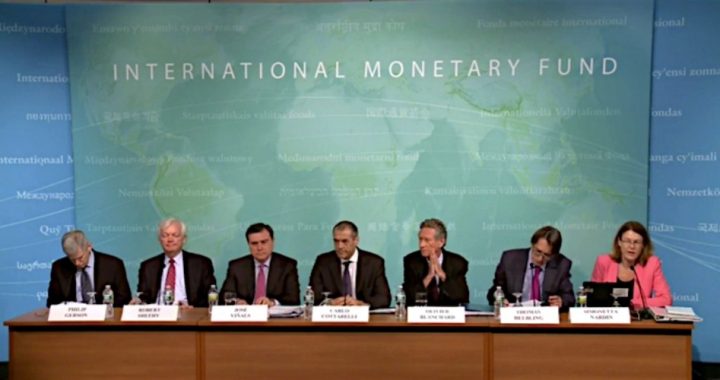
The International Monetary Fund (IMF) is attracting renewed scrutiny after an outraged senior official resigned last month, saying he was “ashamed” to even be associated with the Fund while publicly blasting it for “incompetence,” illegitimate selection of “tainted” leadership, and suppressing critical information
After serving at the global organization for some two decades, IMF economist Peter Doyle — a former division chief at the European Department and a respected advisor when he jumped ship — also said many of the problems were actually “becoming more deeply entrenched.”
“After twenty years of service, I am ashamed to have had any association with the Fund at all,” Doyle wrote, adding that he wished he had understood two decades ago what he knows now. “There are good salty people here. But this one is moving on. You might want to take care not to lose the others.”
In his blistering letter to the IMF’s Executive Board dated June 18, Doyle formally announced that he was leaving and sought to explain his decision. He did, lambasting the organization for a wide range of perceived failings that in his view were only getting worse.
“This is not solely because of the incompetence,” Doyle explained, noting that the problems were partly chronicled in the IMF’s own reports on the global crisis. “It is because the substantive difficulties in these crises, as with others, were identified well in advance but were suppressed here.”
According to Doyle, the IMF should have issued timely, sustained warnings about the looming crises it knew were coming. “The failure of the Fund to issue them is a failing of the first order,” he wrote in the letter, which was recently obtained by CNN and published by media outlets around the world.
Because of those failures and the suppression of key information, Doyle continued, the world is paying a heavy price. “The consequences include suffering (and risk of worse to come) for many including Greece, that the second global reserve currency [the euro] is on the brink, and that the Fund for the past two years has been playing catch-up and reactive roles in the last-ditch efforts to save it,” the letter states.
On top of that, the factors that led to the stunning failures — including what Doyle described as “European bias” — are “becoming more deeply entrenched, notwithstanding initiatives which purport to address them.”
“This fact is most clear in regard to appointments for Managing Director which, over the past decade, have all-too-evidently been disastrous,” Dolyle continued. “Even the current incumbent [Christine Lagarde] is tainted, as neither her gender, integrity, or élan can make up for the fundamental illegitimacy of the selection process.”
All three of the last IMF chiefs have resigned before serving out their full term — most recently after ex-boss Dominique Strauss-Kahn was arrested over allegations of rape. Aside from the scandals, the embattled global institution and its mission have sparked strong criticism as well. Lagarde, meanwhile, has come under fire around the world, too.
Doyle’s harsh criticism of the IMF — a deeply controversial institution seeking to transform itself into a sort of planetary central bank — has erupted into a global media frenzy, with news outlets around the world covering his stinging resignation letter. And analysts say it is part of a broader trend in the elite realm of high finance and global governance.
“The rats everywhere are now jumping furiously off the Titanic,” noted the financial site ZeroHedge in its coverage of Doyle’s criticism, saying that the “scandal-ridden” IMF has “become the butt of all jokes in the international community” — and that it was sinking fast. “This is a scandal in the making, and one which may shake to the core the credibility of the IMF in the context of international organization.”
IMF spokesman William Murray acknowledged that much of the criticism raised by Doyle was already publicly available before his letter surfaced. However, he denied that there was evidence of IMF efforts to suppress information.
“Peter’s remarks are well documented in the public record, including reports issued by the Independent Evaluation Office, via the triennial review of surveillance, and in many statements by the managing director, including on the findings in these various reports,” Murray was quoted as saying. “We have no evidence his views were suppressed, nor that any views were suppressed.”
While the IMF seeks more power for itself in managing the global economy and, they hope, even a new world monetary system, critics argue that the institution should actually be abolished, or at least seriously reformed. However, in the near-term at least, with debt-laden governments around the world seeking bailouts to remain afloat, the chances of reining in the Fund appear to be low.
Related articles:
IMF as Global Fed: G20’s Agenda Behind the Agenda
IMF Economists: Huge U.S. Tax Hikes Needed
Global Fusion: The G20, IMF, and World Government
IMF Seeks New Mandate, Global Currency
IMF Managing Dir. Arrested on Charges of Sexual Assault of NYC Hotel Maid



